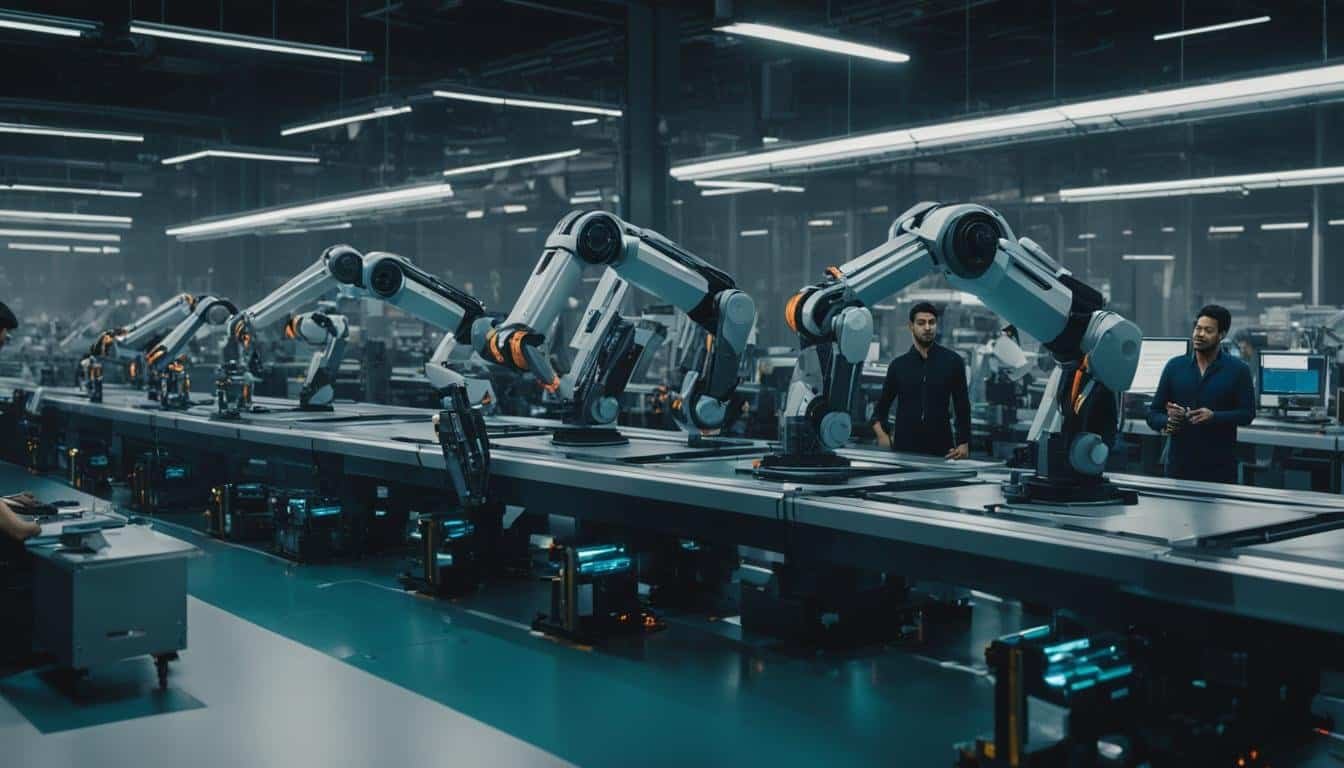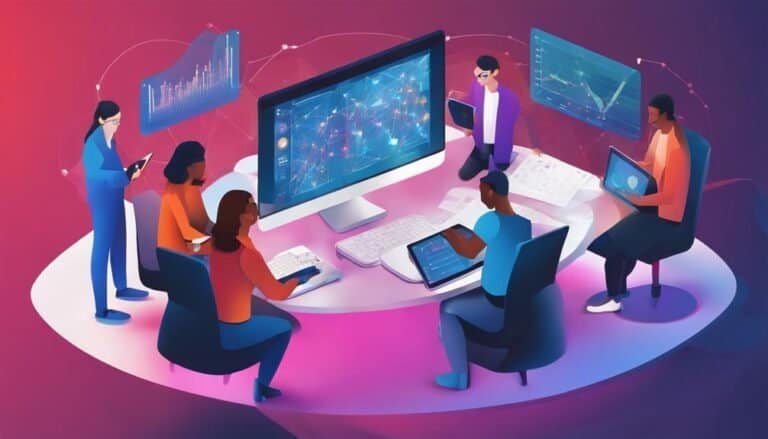The Impact of AI on Traditional Careers: Insights and Trends
Artificial Intelligence (AI) is revolutionizing the job market, transforming industries, and reshaping traditional careers. As AI technology advances, it has both positive and negative implications for employment and work dynamics.
One of the key concerns is the potential job displacement caused by AI and automation. Tasks that were once performed by humans can now be automated, leading to job loss in certain sectors. However, AI also presents new career opportunities, as it creates demand for professionals with AI-related skills and expertise.
The future of work is being shaped by AI, with predictions of a workforce shift as AI systems take over repetitive and mundane tasks. This shift will require workers to adapt and acquire new skills to remain relevant in an AI-driven job market.
While some individuals may be concerned about job loss due to AI, it is important to acknowledge that AI technology can enhance productivity, decision-making, and innovation. It has the potential to transform industries such as healthcare, finance, manufacturing, customer service, and more.
As with any significant technological advancement, there are ethical considerations to address. Ensuring responsible AI practices, mitigating biases, and protecting privacy are crucial for the ethical implementation of AI in the workplace.
In this article, we will explore the impact of AI on traditional careers, delve into the scope and importance of AI, discuss the challenges and opportunities it presents, and examine the future of work in an AI-driven world.
Key Takeaways:
- AI is revolutionizing the job market and transforming traditional careers.
- Job displacement is a concern, but AI also creates new career opportunities.
- The future of work requires adaptation and acquisition of new skills.
- AI has the potential to enhance productivity and innovation in various industries.
- Responsible AI practices and ethical considerations are necessary for a balanced implementation.
Defining Artificial Intelligence
Artificial Intelligence (AI) is a transformative technology that encompasses the development of intelligent software systems capable of performing tasks traditionally requiring human intelligence. These AI systems leverage advanced algorithms and computational power to manipulate and analyze vast amounts of data, unlocking valuable insights that drive business efficiency, innovation, and automation.
AI applications span a wide range of industries and sectors, revolutionizing the way we work and live. From self-driving cars that navigate roads autonomously to virtual assistants that streamline our daily tasks, AI has become an integral part of our modern society. Additionally, AI plays a vital role in critical fields such as medical diagnosis, where it enhances accuracy and efficiency, and financial analysis, where it supports data-driven decision-making.
As AI continues to advance, it holds the potential to drive unprecedented levels of automation and innovation. The ability of AI software systems to learn, adapt, and improve over time enables organizations to optimize their operations, deliver personalized experiences, and unlock new opportunities for growth. The power of automation combined with the intelligence of AI opens doors to endless possibilities and transformative change.
“AI is not just about building intelligent machines; it’s about building intelligent machines that can learn, reason, and interact with humans in a natural and intuitive way.” – Sundar Pichai
By understanding the definition and capabilities of AI, we can appreciate the profound impact it has on industries, job markets, and society as a whole. In the following sections, we will delve deeper into the scope and importance of AI, the challenges and opportunities it presents, and the necessary skills for success in an AI-driven world.
Innovation with AI
The innovative potential of AI is boundless, with ongoing research and development paving the way for groundbreaking advancements. Industries across the board are exploring new ways to harness AI’s power to solve complex problems, optimize processes, and create value for their stakeholders. Whether it’s the automation of mundane tasks or the integration of AI-powered technologies, organizations are continuously leveraging AI to push the boundaries of what is possible.
AI Applications
The applications of AI are diverse and far-reaching, with each sector finding unique ways to leverage AI’s capabilities. Some noteworthy applications include:
- Self-driving cars: AI algorithms enable autonomous vehicles to perceive the environment, make decisions, and navigate safely on the roads.
- Virtual assistants: AI-powered virtual assistants like Siri and Alexa understand natural language and perform tasks based on user commands.
- Medical diagnosis: AI systems analyze medical data to assist doctors in accurate diagnosis and treatment recommendations.
- Financial analysis: AI algorithms process vast amounts of financial data, providing insights for investment decisions and risk management.
As AI continues to advance, we can expect its applications to expand further, transforming industries and shaping the future of work.
Scope and Importance of Artificial Intelligence
Artificial Intelligence (AI) is poised to revolutionize the job market, bringing about significant changes and opportunities. With its ability to automate tasks, improve decision-making processes, and create new employment opportunities, AI is set to have a far-reaching impact on various aspects of society.
One of the most significant contributions of AI is its potential to revolutionize the job market. By automating repetitive and mundane tasks, AI technology allows workers to focus on more complex and creative work. This shift in job roles not only enhances productivity and efficiency but also opens up new avenues for career growth and specialization.
The economic impact of AI cannot be understated. As AI becomes integrated into various industries, it has the potential to drive economic growth, increase productivity, and enhance global competitiveness. By streamlining processes, optimizing resource allocation, and reducing costs, AI creates value and propels industries forward.
However, the widespread adoption of AI also poses challenges and implications. The job market may experience significant disruption as certain roles become automated. This displacement necessitates the upskilling and reskilling of the workforce to adapt to AI-driven job requirements. Policymakers, businesses, and workers must work together to address these challenges and ensure a smooth transition.
Collaboration and investment in upskilling and reskilling programs are crucial for individuals to remain competitive in an AI-driven job market. By acquiring AI-related skills, workers can position themselves for career opportunities in emerging fields. Furthermore, the continuous development of soft skills, such as problem-solving and effective communication, will be invaluable in an AI-dominated workplace.
AI has the power to revolutionize the job market, enhance economic growth, and create new opportunities. However, its implementation needs to be approached responsibly, with a focus on upskilling and collaboration among stakeholders.
Overall, the scope and importance of artificial intelligence cannot be overstated. It has the potential to revolutionize industries, transform job roles, and impact economic growth. By embracing AI’s potential, investing in upskilling and reskilling, and fostering collaboration, we can navigate the AI revolution and shape a future where humans and AI technology work hand in hand to drive innovation and prosperity.
Automation and Job Displacement
Automation, driven by AI, has a profound impact on employment by replacing repetitive and predictable tasks traditionally performed by humans. Job displacement is becoming a reality as technology advances, particularly for low-skilled jobs that are easily automated. Industries such as data entry and assembly line work are at high risk of automation, potentially leading to job loss in these sectors.
To thrive in the face of automation, workers must adapt to the changing job market. Enhancing skills and transitioning to roles that are less susceptible to automation is crucial for long-term employability. Upskilling and reskilling programs play a significant role in preparing the workforce for the future of work with AI, equipping individuals with the knowledge and capabilities needed to embrace new employment opportunities.

One example of job displacement due to automation is the automation of low-skilled jobs. The following table outlines some common low-skilled jobs that are at a high risk of automation:
| Low-skilled Jobs at Risk of Automation |
|---|
| Data entry |
| Assembly line work |
| Telemarketing |
| Food service |
“Automation is not a futuristic concept; it’s already happening. Workers need to be proactive in upskilling and adapting to remain relevant in the evolving job market.” – Industry Expert
The Importance of Workforce Adaptation
Workforce adaptation is crucial in the era of automation. While certain jobs may become vulnerable to automation, a shift towards roles that require human creativity, critical thinking, and emotional intelligence is expected. By cultivating these skills and acquiring a versatile skill set, workers can position themselves for success in the AI-driven job market.
It is worth noting that automation also brings new employment opportunities. AI-driven technologies require skilled professionals to develop, operate, and maintain them. By embracing the transformative power of AI and acquiring the necessary skills, individuals can not only adapt to the changing job landscape but also contribute to the advancement of AI technologies.
Industries Most at Risk of Automation
Automation is rapidly transforming various industries, leading to increased efficiency and productivity. However, certain sectors face a higher risk of automation due to the repetitive and predictable nature of their tasks. Here are some industries that are particularly vulnerable to automation:
- Manufacturing: With advancements in robotics and AI-powered machinery, manufacturing processes are increasingly automated. This includes tasks like assembly line operations, quality control, and packaging.
- Transportation: The transportation industry, especially trucking and delivery services, is undergoing significant automation. Self-driving vehicles and logistics management systems are revolutionizing the way goods are transported.
- Customer Service: AI-powered chatbots and virtual assistants are increasingly used in customer service roles to automate routine inquiries and provide instant support.
- Finance: Automation is reshaping the finance industry, with AI algorithms automating tasks like data analysis, fraud detection, and risk assessment.
- Healthcare: AI is revolutionizing healthcare by automating medical imaging analysis, assisting in diagnostics, and improving patient care. AI-powered robots are also being developed for tasks like surgical procedures and patient monitoring.
- Education: The education sector is witnessing the integration of AI technologies to personalize learning experiences, automate administrative tasks, and provide virtual tutoring.
As these industries continue to adopt automation technologies, it is crucial for workers to adapt and stay updated on the latest technological advancements. By developing new skills and embracing technology, individuals can remain competitive in the evolving job market.
To illustrate the impact of automation in these industries, let’s take a closer look at the current level of automation in manufacturing:
| Industry | Level of Automation |
|---|---|
| Automotive Manufacturing | Highly automated with robotic assembly lines and advanced machinery. |
| Electronics Manufacturing | Significant automation in areas like PCB assembly and quality control. |
| Textile Manufacturing | Automation in processes like weaving, spinning, and fabric cutting. |
| Food Processing | Partial automation in packaging, sorting, and quality control. |
The level of automation varies across different subsectors within manufacturing. While automotive manufacturing is highly automated with robotic assembly lines and advanced machinery, other sectors like food processing have partially automated processes such as packaging, sorting, and quality control. This demonstrates the diverse impact of automation within the manufacturing industry.
The Rise of AI-based Technologies and Their Impact on Job Creation
AI-based technologies, such as natural language processing and computer vision, are driving a revolution in the job market, paving the way for new employment opportunities. These cutting-edge technologies are reshaping various industries and transforming the way work is carried out.
One sector that is experiencing the transformative power of AI is healthcare. AI-powered healthcare systems are enabling doctors to diagnose and treat patients with greater accuracy and efficiency. Through advanced algorithms and data analysis, these systems can quickly analyze vast amounts of medical information, aiding in disease detection, personalized treatment plans, and even surgical procedures.
Similarly, the financial industry is benefiting from AI-powered technologies. AI-driven financial systems can help banks and financial institutions make more informed investment decisions by analyzing market trends, identifying patterns, and assessing risks. This not only enhances the decision-making process but also contributes to more efficient and profitable financial operations.
As AI-based technologies continue to evolve, they are creating new opportunities for individuals to upskill and specialize in AI-related roles. The demand for professionals with expertise in AI is growing rapidly, opening doors to rewarding careers in areas such as data science, machine learning, and AI ethics.
Organizations and educational institutions are stepping up to provide upskilling opportunities for individuals aiming to embrace the potential of AI-based technologies. Training programs, certifications, and online courses are being offered to develop the necessary skills and knowledge to excel in this exciting field.
Furthermore, AI-based technologies are driving innovation and entrepreneurship, leading to the creation of start-ups and job opportunities in various sectors. The development and implementation of AI-powered solutions require multidisciplinary teams, including data scientists, engineers, and business professionals, fostering collaboration and diversity in the workplace.
Upskilling Opportunities in AI-powered Technologies
To thrive in this rapidly evolving landscape, individuals seeking to capitalize on the opportunities presented by AI-powered technologies can take advantage of several upskilling opportunities:
- Enroll in data science and machine learning courses to develop a strong foundation in AI principles and techniques.
- Stay updated with the latest advancements in AI through online resources, research papers, and industry events.
- Participate in AI hackathons and competitions to enhance practical skills and gain hands-on experience.
- Join professional communities and forums to network with experts and stay informed about job opportunities.
- Consider pursuing specialized certifications in areas such as AI ethics, natural language processing, or computer vision.
AI-based technologies have the potential to revolutionize the job market, creating new employment opportunities and reshaping industries. The rise of AI-powered healthcare systems and financial solutions highlights the immense impact of these technologies. As AI continues to advance, upskilling and specialization in AI-related roles will be critical for individuals aiming to thrive in this changing landscape. AI Innovations Magazine
One effective way to adapt to the changing job market influenced by AI is upskilling through targeted courses that provide in-depth knowledge and hands-on experience. For those looking to delve deeper into the fascinating world of AI, it can be highly beneficial to take a course on AI that covers fundamental concepts such as machine learning, deep learning, and natural language processing.
Impact of AI on High-skilled Jobs
Artificial Intelligence (AI) is revolutionizing the landscape of high-skilled jobs by automating mundane tasks and augmenting human capabilities. This transformative technology has the potential to reshape job roles and create a more efficient and productive workforce.
With AI’s ability to automate repetitive and predictable tasks, high-skilled professionals can now focus on more meaningful and high-value activities that require their expertise and creativity. By delegating mundane tasks to AI, professionals can allocate their time and energy towards strategic decision-making and innovation.
AI’s impact on high-skilled jobs is twofold. While certain job roles may become obsolete as a result of automation, new opportunities arise as AI reshapes the workforce. Professionals need to embrace these changes, adapt their skill sets, and explore the emerging job roles in AI-related fields.
Embracing AI’s potential to augment human capabilities is crucial to staying relevant and competitive in the evolving job market. High-skilled professionals can leverage AI technology to enhance their performance and productivity, enabling them to achieve higher levels of efficiency and effectiveness in their work.
For example, AI-powered tools can assist professionals in performing complex data analysis, accelerating their decision-making processes, and providing valuable insights. This collaboration between humans and AI results in a symbiotic relationship, where AI complements and enhances human capabilities.
As AI reshapes job roles, it is essential for professionals to acquire the necessary skills to leverage AI technology effectively. This includes developing expertise in AI-related domains such as machine learning and data science. Additionally, cultivating soft skills such as communication, critical thinking, and adaptability will remain crucial in the AI-driven job market.
By embracing the potential of AI and continuously upskilling, high-skilled professionals can navigate the changing job landscape and harness the benefits of this transformative technology.
Key takeaways:
- AI automates mundane tasks, allowing high-skilled professionals to focus on more meaningful and high-value activities.
- While certain job roles may become obsolete, AI reshapes the job market, creating new opportunities.
- AI augments human capabilities, enhancing decision-making processes and productivity.
- Upskilling in AI-related domains and cultivating soft skills are essential for success in the AI-driven job market.
Upskilling and Reskilling for the AI-driven Job Market
In the rapidly evolving AI-driven job market, upskilling and reskilling have become essential for workers to remain competitive and relevant. The demand for AI-related skills is on the rise, and organizations are offering various training programs and certifications to help individuals acquire these skills.
Acquiring AI-related skills involves gaining expertise in areas such as data analysis, machine learning, and programming. These skills can open up a host of career opportunities in industries that are leveraging AI technologies.
Additionally, soft skills play a crucial role in the AI-driven job market. Effective communication, critical thinking, and problem-solving skills are highly sought after by employers who recognize the value of human connection and creativity in a technology-driven landscape.
Training programs and certifications in AI-related skills can be found through reputable organizations such as:
- IBM
- Microsoft
- Amazon Web Services (AWS)
These programs offer comprehensive learning resources, hands-on training, and assessments to ensure individuals gain the practical skills needed to thrive in the AI-driven job market.
Soft Skills for Success in the AI-driven Job Market
While technical skills are crucial, the importance of soft skills should not be overlooked. In an AI-driven economy, individuals who possess strong soft skills are better equipped to collaborate, innovate, and adapt in dynamic work environments.
Here are some essential soft skills for success in the AI-driven job market:
- Effective Communication: The ability to clearly articulate ideas and concepts, as well as listen actively, is vital for collaborating with colleagues, clients, and stakeholders. Effective communication ensures smooth workflow and builds trust among team members.
- Problem-Solving: AI technology presents unique challenges, and workers must be adept at creative problem-solving to navigate these obstacles. The ability to think critically, analyze complex situations, and propose innovative solutions will be highly valued.
- Adaptability: The AI-driven job market is constantly evolving, requiring individuals to adapt to new technologies, methodologies, and work practices. Having the flexibility to embrace change and learn new skills quickly is a valuable attribute.
By combining technical expertise with strong soft skills, individuals can position themselves as valuable assets in the AI-driven job market.
“The future belongs to those who can harness the power of AI while maintaining a human touch. By upskilling and developing strong soft skills, individuals can thrive in the AI-driven job market and contribute to a more efficient and impactful future of work.”
Investing in upskilling and reskilling not only equips individuals with the skills needed to succeed in the AI-driven job market but also ensures long-term career prospects in an ever-evolving technological landscape.
Organizations Offering AI-related Training Programs
| Organization | AI-related Training Programs | Certifications Offered |
|---|---|---|
| IBM | AI Foundations for Business | IBM AI Engineer |
| Machine Learning Crash Course | TensorFlow Developer Certificate | |
| Microsoft | Azure Machine Learning | Microsoft Certified: Azure AI Engineer Associate |
| Amazon Web Services | Machine Learning Essentials | AWS Certified Machine Learning – Specialty |
Importance of Soft Skills in the AI-driven Job Market
In the ever-evolving AI-driven job market, technical skills are undoubtedly crucial for success. However, it is equally important to recognize and value the significance of soft skills. These skills play a vital role in enhancing collaboration, customer experiences, and problem-solving in the workplace.
Effective communication is a fundamental soft skill that fosters understanding, clarity, and efficient teamwork. It enables professionals to convey ideas, instructions, and feedback effectively, whether it is with colleagues, clients, or customers. Strong communication skills are particularly valuable in cross-functional AI projects, where effective collaboration among diverse teams is essential.
“The most important thing in communication is hearing what isn’t said.” – Peter Drucker
Empathy is another critical soft skill that offers a deeper understanding of clients’ and customers’ needs, concerns, and emotions. In an AI-driven job market, empathy enables workers to forge meaningful connections, anticipate customer preferences, and provide personalized experiences. This fosters customer loyalty, satisfaction, and a competitive edge for organizations.
Creative problem-solving is increasingly sought-after in an AI-driven job market that values innovation and unique solutions. As AI systems automate routine tasks, professionals are expected to tackle more complex challenges that require creative thinking and out-of-the-box problem-solving abilities. By embracing creativity, individuals can identify opportunities, drive innovation, and position themselves as valuable assets in the AI-powered workplace.
The Importance of Soft Skills in the AI-driven Job Market:
To summarize, soft skills such as effective communication, empathy, and creative problem-solving are indispensable in the AI-driven job market. While technical skills enable professionals to navigate the complexities of AI systems, soft skills enhance collaboration, customer experiences, and the ability to innovate. The well-rounded combination of technical expertise and soft skills is the key to thriving in this digital era.
The Future of Work and AI Relationship
The future of work is rapidly evolving with the integration of artificial intelligence (AI) technologies. Automation, the gig economy, remote work, and AI-driven hiring processes are among the key factors that are shaping the future of work.
Automation, driven by AI, is transforming industries and revolutionizing the workplace. While it may replace certain jobs that involve repetitive and predictable tasks, it also presents new opportunities for workers to upskill and focus on more meaningful and creative endeavors.
“The integration of AI technologies has the potential to enhance productivity and efficiency in various industries, leading to overall economic growth and development. It is important for businesses and individuals to embrace the possibilities offered by AI and adapt to the changing nature of work.” – Alex Thompson, AI expert
The gig economy, characterized by freelance and contract work, is gaining momentum in the AI-driven workplace. It provides flexibility and autonomy for workers, allowing them to choose projects and clients that align with their skills and interests. The gig economy also offers businesses the opportunity to tap into a global talent pool and access specialized expertise on demand.
Technological advancements have enabled remote work to become increasingly prevalent. AI-powered collaboration tools and communication platforms allow workers to collaborate and engage with teams from anywhere in the world. Remote work not only enhances work-life balance, but also reduces commuting time and boosts employee satisfaction.
The Impact of AI-driven Hiring Processes
AI-driven hiring processes are transforming the way organizations identify and recruit talent. AI algorithms analyze large volumes of data to identify the most suitable candidates for specific roles, streamlining the recruitment process and enhancing the efficiency of talent acquisition. This technology enables businesses to find the right candidates faster and make data-driven hiring decisions.
“AI-driven hiring processes have the potential to eliminate bias, improve candidate matching, and enhance diversity in the workplace. Leveraging AI technologies in recruitment can help organizations build stronger and more inclusive teams.” – Jessica Lee, HR consultant
The use of generative AI, which involves the creation of new content or ideas by AI systems, is also an emerging trend in the future of work. From generating personalized marketing campaigns to creating unique design concepts, generative AI has the potential to unlock new possibilities across various industries.
In summary, the future of work is characterized by the integration of AI technologies that drive automation, facilitate the gig economy, enable remote work, and revolutionize hiring processes. By embracing these advancements, businesses and individuals can navigate the evolving landscape, harness the benefits of AI, and create a more efficient and effective work environment.
AI’s Ethical Considerations and Human-AI Collaboration
As the prevalence of AI continues to grow, there are important ethical considerations that need to be addressed. The impact of AI on job displacement, privacy, bias, and fairness cannot be ignored. Organizations must adopt responsible AI practices to ensure that the benefits of AI are harnessed while also mitigating potential negative consequences.
Ethical considerations in AI:
One of the key ethical considerations in AI is the potential displacement of jobs. While AI can automate repetitive tasks and improve efficiency, it may also lead to job loss for certain roles. Careful planning and collaboration are necessary to ensure a smooth transition for affected workers.
Another critical ethical consideration is AI’s impact on privacy. As AI systems gather and analyze vast amounts of data, there is a need to protect individuals’ privacy rights and ensure responsible data handling practices.
Bias is another concern in AI applications. Machine learning algorithms can inadvertently reflect and amplify existing biases present in the data they are trained on. It is essential to address and mitigate bias to ensure fair and equitable outcomes.
Human-AI collaboration:
Human-AI collaboration plays a vital role in harnessing the strengths of both humans and AI systems. While AI can automate repetitive tasks and process large amounts of data, human intelligence brings creativity, critical thinking, and empathy to the table.
Collaboration between humans and AI can result in more effective decision-making processes, enhanced problem-solving, and improved outcomes. By leveraging the complementary capabilities of humans and AI, organizations can achieve better results than either could achieve alone.
Responsible AI practices:
Responsible AI practices are essential to ensure that AI is developed and deployed in a way that aligns with ethical principles and societal values. Organizations should prioritize transparency, accountability, and fairness in their AI systems.
Regular audits and evaluations of AI systems can help identify and address issues related to bias, privacy, and ethical concerns. Additionally, clear guidelines and regulations must be established to govern the use of AI and protect individuals’ rights.
“The development and deployment of AI require constant monitoring and recalibration to ensure that it continues to benefit society while being aligned with ethical considerations.” – AI Ethics Expert
Ethical Considerations in AI and Responsible AI Practices
| Ethical Considerations | Responsible AI Practices |
|---|---|
| Job displacement | Collaborative planning for smooth transitions, upskilling and reskilling programs |
| Privacy | Responsible data handling, informed consent, data anonymization |
| Bias | Bias detection and mitigation, diverse and representative training data |
| Transparency | Clear explanations of AI system decisions, auditable algorithms |
| Accountability | Establishment of guidelines and regulations, ethical AI frameworks |
| Fairness | Equity-focused AI system design, fairness assessments |
By considering the ethical implications of AI and fostering human-AI collaboration, we can harness the power of AI while ensuring its responsible and beneficial use in our society.
Conclusion
AI’s impact on traditional careers cannot be understated. This transformative technology presents both challenges and opportunities for individuals and organizations in various industries.
Job displacement is a significant concern as AI automates tasks once performed by humans. However, with the right approach, AI can also create new job opportunities and enhance productivity. To thrive in the AI-driven job market, it is crucial for individuals to adapt and upskill, acquiring the necessary knowledge and abilities to work alongside AI systems.
Moreover, industries are being reshaped by the transformative effects of AI. The demand for specific skills is evolving, and the workforce must embrace the potential of AI to remain competitive. By upskilling and adapting, organizations can navigate the shifting job market, harness AI’s potential, and create a more efficient and impactful future of work.
Source Links
- https://www.linkedin.com/pulse/impact-artificial-intelligence-job-market-5-key-trends
- https://www.forbes.com/sites/serenitygibbons/2023/12/07/how-ai-might-impact-the-job-market-in-2024/?sh=e05d86a461d4
- https://www.linkedin.com/pulse/impact-artificial-intelligence-job-market-trends-sudharsan-thangavel







